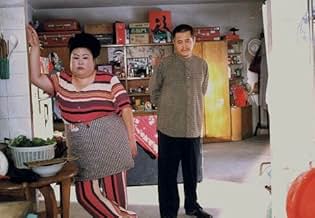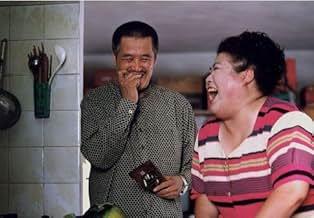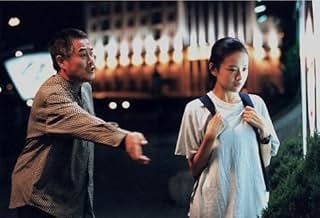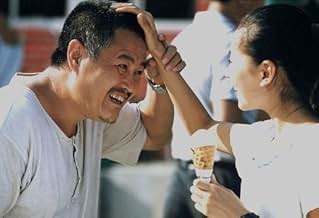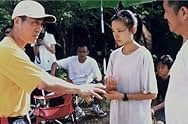IMDb RATING
7.3/10
4.3K
YOUR RATING
An aging bachelor has to engage his old, laid-off friends to keep a blind girl happy as a masseuse at a non-existent massage parlor.An aging bachelor has to engage his old, laid-off friends to keep a blind girl happy as a masseuse at a non-existent massage parlor.An aging bachelor has to engage his old, laid-off friends to keep a blind girl happy as a masseuse at a non-existent massage parlor.
- Director
- Writers
- Stars
- Awards
- 5 wins & 4 nominations total
- Director
- Writers
- All cast & crew
- Production, box office & more at IMDbPro
Featured reviews
This film will either get to you like a death in the family, or leave no lasting impression on you whatsoever. I'm among those who fit in with the first part. Maybe family death is exaggerating but that doesn't matter, this is still A VERY POWERFUL FILM. This film proves that ZHANG YIMOU IS THE BEST DIRECTOR ALIVE (as Alferd Hitchcock and Akira Kurosawa are dead). The best actor in this film is actually the blind girl (sure, she's no River Pheonix, but who is?) who always gives you the impression that she's blind (unlike some American actors in American films). Yet she happens to know more than you think in the end (no spoilers on that). To see this film on the big screen was too much, 10 out of 10. Oh, and watch out for Hero, from the same director of this.
No longer partnered, artistically or domestically, with the stunning Gong Li, director Zhang Yimou has probably redeemed himself with Party satraps through his engaging serio-comic "Happy Days." (He's been in and out of hot water with past films.) Destined to reach a miniscule audience in theaters, this touching film ought to be widely viewed when released for sale or rental.
Set in an unnamed Chinese city (definitely not Beijing), the story revolves around retired factory worker Zhau, just over fifty, and a blind teenager, Wu Ying, stepdaughter of the corpulent and avaricious woman the impecunious Zhau seeks as a wife. Wu Ying, blind since early childhood from a tumor, has to deal not only with her witch of a stepmom (dad fled from her and is supposedly in a far off city working to send money to bring his daughter to him) but with her stepbrother, a bulbous slobus amoebus training to match his mother's nastiness.
Zhau has a covey of good friends. His first get rich scheme, hatched up with his closest friend, is to "restore" a derelict bus in a park to its pristine state so it can be rented for quick, hot sheet assignations ("Happy Times Hotel"). Americans will find the Chinese take on non-marital, catch-as-catch-can sex naive but it reflects tension balanced by humor in a country where the citified young seek freedoms their elders never enjoyed.
The core of the story is Zhau's attempts to take care of Yu Wing after the evil stepmom throws her at Zhau and tells him to get her out of the house and keep her out. With his friends, all equally hovering near or under the poverty line, Zhau sets Yu Wing up as a masseuse in a fake massage parlor in a decrepit abandoned factory, the legitimate kind of parlor, not the type I heard about when an Army officer in severalAsian countries (Yu Wing was trained to give massages).
I won't reveal the lengths Zhau and his gang go to in their effort to sustain Yu Wing and make her happy. Some of their scheming is very funny. The ending reflects, hardly for the first time, Zhang Yimou's skill not only as a top director but also as a talented storyteller.
I've never seen the actor and actress who play the leads before. They simply blend their performances convincingly into a seamless story that says more about the possibilities and rewards of empathy and the joys of caring than it does about modern China. The locales here range from an affluent downtown to a condemned, empty factory. There's hardly any politics. It's sad, though, that a decent, retired factory worker can't spring for a 25 yuan Haagen Daz small cone offered in a shop that could have been imported from Main Street.
Put this one on your to-rent list!!
Set in an unnamed Chinese city (definitely not Beijing), the story revolves around retired factory worker Zhau, just over fifty, and a blind teenager, Wu Ying, stepdaughter of the corpulent and avaricious woman the impecunious Zhau seeks as a wife. Wu Ying, blind since early childhood from a tumor, has to deal not only with her witch of a stepmom (dad fled from her and is supposedly in a far off city working to send money to bring his daughter to him) but with her stepbrother, a bulbous slobus amoebus training to match his mother's nastiness.
Zhau has a covey of good friends. His first get rich scheme, hatched up with his closest friend, is to "restore" a derelict bus in a park to its pristine state so it can be rented for quick, hot sheet assignations ("Happy Times Hotel"). Americans will find the Chinese take on non-marital, catch-as-catch-can sex naive but it reflects tension balanced by humor in a country where the citified young seek freedoms their elders never enjoyed.
The core of the story is Zhau's attempts to take care of Yu Wing after the evil stepmom throws her at Zhau and tells him to get her out of the house and keep her out. With his friends, all equally hovering near or under the poverty line, Zhau sets Yu Wing up as a masseuse in a fake massage parlor in a decrepit abandoned factory, the legitimate kind of parlor, not the type I heard about when an Army officer in severalAsian countries (Yu Wing was trained to give massages).
I won't reveal the lengths Zhau and his gang go to in their effort to sustain Yu Wing and make her happy. Some of their scheming is very funny. The ending reflects, hardly for the first time, Zhang Yimou's skill not only as a top director but also as a talented storyteller.
I've never seen the actor and actress who play the leads before. They simply blend their performances convincingly into a seamless story that says more about the possibilities and rewards of empathy and the joys of caring than it does about modern China. The locales here range from an affluent downtown to a condemned, empty factory. There's hardly any politics. It's sad, though, that a decent, retired factory worker can't spring for a 25 yuan Haagen Daz small cone offered in a shop that could have been imported from Main Street.
Put this one on your to-rent list!!
Yimau Zhang takes us along for a ride to explore how things seem to have changed in China. The country has given a step forward into the modern age as it shakes off its rigid past, adopting new ways in doing things. In fact, the country appears to have developed its own take on capitalism, as we watch a new prosperous, and aggressive China, transformed in ways we had not envisioned before. Mr. Zhang's film is an allegory about his country.
The main idea in the film is how Zhao, a factory worker, sets his eyes on a plump and attractive woman to get married. The woman, in turn, has her own ideas of what to expect from this man who lies to her and makes himself pass for a hotel manager. Thinking this is the case, the lady friend proposes he employs her stepdaughter, a blind girl that has been abandoned by her father, who has decamped to another city.
Zhao, who wants to keep the girlfriend happy, decides to take Wu Ying to work at his hotel, which in reality is a bus, that he and his buddy have converted in a lovers' motel, in a park. But before he can do anything, Zhao watches in horror as how some cleaning crews are taking his livelihood away because they are beautifying the area. Zhao is stuck with Wu Ying, so he takes her to his own humble apartment.
Zhao and his friends from the factory devise a plan to convert space in the dilapidated building a massage parlor so that the blind girl can work. The only thing, there are no clients, and only Zhao's friends are enrolled to tip the young woman using Zhao's own money.
The film is a delightful comedy about how being entrepreneurial backfires on the well intentioned man. The blind girl, Wu Ying, knows much more than what Zhao and the rest give her credit for, and unfortunately, everything ends badly, except for the blind girl, who recognizes the kindness of his mentor, who doesn't get to know first hand of her gratitude because fate intervenes.
"Happy Times" is a charming film that works thanks to the light touch by the director. Benshan Zhao, who has been seen in other Chinese films is excellent in the role of Zhao. Jie Dong plays Wu Ying with conviction and Lifan Dong, is the stepmother, who discovers the duplicity of her would be husband.
Recommended to all Yimou Zhang's fans who might have missed its commercial run.
The main idea in the film is how Zhao, a factory worker, sets his eyes on a plump and attractive woman to get married. The woman, in turn, has her own ideas of what to expect from this man who lies to her and makes himself pass for a hotel manager. Thinking this is the case, the lady friend proposes he employs her stepdaughter, a blind girl that has been abandoned by her father, who has decamped to another city.
Zhao, who wants to keep the girlfriend happy, decides to take Wu Ying to work at his hotel, which in reality is a bus, that he and his buddy have converted in a lovers' motel, in a park. But before he can do anything, Zhao watches in horror as how some cleaning crews are taking his livelihood away because they are beautifying the area. Zhao is stuck with Wu Ying, so he takes her to his own humble apartment.
Zhao and his friends from the factory devise a plan to convert space in the dilapidated building a massage parlor so that the blind girl can work. The only thing, there are no clients, and only Zhao's friends are enrolled to tip the young woman using Zhao's own money.
The film is a delightful comedy about how being entrepreneurial backfires on the well intentioned man. The blind girl, Wu Ying, knows much more than what Zhao and the rest give her credit for, and unfortunately, everything ends badly, except for the blind girl, who recognizes the kindness of his mentor, who doesn't get to know first hand of her gratitude because fate intervenes.
"Happy Times" is a charming film that works thanks to the light touch by the director. Benshan Zhao, who has been seen in other Chinese films is excellent in the role of Zhao. Jie Dong plays Wu Ying with conviction and Lifan Dong, is the stepmother, who discovers the duplicity of her would be husband.
Recommended to all Yimou Zhang's fans who might have missed its commercial run.
Zhao is a 50 year old unemployed loser making one last attempt at finding love. He courts a portly divorcee, but keeps having to lie to pass himself off as a better catch than he really is. Eventually, of course, the lies backfire. Zhao tells his sweetheart that he is the manager of a fancy hotel. She responds by foisting her blind stepdaughter off on him, confident that he can easily find her employment at his fancy hotel.
What follows is a funny, unlikely and touching relationship between Zhao and the blind girl Wu. While Zhao is terribly misguided, constructing elaborate deceptions to keep Wu "employed" at the non-existent hotel, he does these wrong things for the right reasons. Zhao does find love, but it isn't the woman or the love he expected.
This is an excellent film and there are three big reasons why: First of all, it's directed by Zhang Yimou who may well be the best director alive. This isn't a masterpiece like "Raise the Red Lantern," but seeing the phrase "Directed by Zhang Yimou" should be enough to tell you the next two hours will be well spent.
The second and third reasons are Benshan Zhao as Zhao and Jei Dong as Wu. Zhao is a respected Chinese comedian, but the role here is really a mixture of comedy and drama. Zhao gives the mixture exactly the right touch. But the real revelation is Jei Dong. I found myself wondering through the entire movie if she were really blind. She is that good. (And I still don't know the answer.)
Don't expect a laugh out loud comedy if you see this movie. It is very funny in places, but frequently that humor is very uncomfortable. And frequently happy times aren't really what they seem.
What follows is a funny, unlikely and touching relationship between Zhao and the blind girl Wu. While Zhao is terribly misguided, constructing elaborate deceptions to keep Wu "employed" at the non-existent hotel, he does these wrong things for the right reasons. Zhao does find love, but it isn't the woman or the love he expected.
This is an excellent film and there are three big reasons why: First of all, it's directed by Zhang Yimou who may well be the best director alive. This isn't a masterpiece like "Raise the Red Lantern," but seeing the phrase "Directed by Zhang Yimou" should be enough to tell you the next two hours will be well spent.
The second and third reasons are Benshan Zhao as Zhao and Jei Dong as Wu. Zhao is a respected Chinese comedian, but the role here is really a mixture of comedy and drama. Zhao gives the mixture exactly the right touch. But the real revelation is Jei Dong. I found myself wondering through the entire movie if she were really blind. She is that good. (And I still don't know the answer.)
Don't expect a laugh out loud comedy if you see this movie. It is very funny in places, but frequently that humor is very uncomfortable. And frequently happy times aren't really what they seem.
10dsulpy
It seems that most of the negative reviews that this film has gotten are based upon people's misconception that the film should be what THEY want it to be, not what it really is. The truth is, although there's certainly humor in the film, it's not a comedy - nor does it pretend to be a fairy tale, or a social expose, or a political statement. To me, it's a film about cruelty and compassion - both by human beings and by fate. I found it both life-affirming, and heartbreaking - often at the same time, and I thought the acting was excellent on everyone's part. To me, well worth seeing, and quite unique.
Did you know
- TriviaDirector Zhang Yimou issued a casting call via the Internet for role of the blind girl. Eventual lead Dong Jie was selected from some 40,000 girls who auditioned for the role.
- Alternate versionsSPOILER: There are two cuts of this film; the original Chinese Theatrical Cut and an International Cut, which is six minutes longer. The International Cut features more content in the early scenes when the two couples come to the Happy Times Hut hoping to have sex. In the Chinese cut, these scenes are more ambiguous as to what the couples have in mind. Additionally, the International Cut has a longer and very different conclusion. In the Chinese cut, after Zhao (Benshan Zhao) writes the letter supposedly from Ying's father, the film cuts to him reading it to her as the credits start to role. In the International Cut, however, after Zhao leaves the restaurant in which he writes the letter, he is hit by a car. In hospital, his friends come to see him, finding the letter to Ying (Jie Dong). Upon returning to her apartment, however, they find it deserted. A tape recording Ying has made and left behind explains that she knew all along the Happy Times Hotel didn't exist, but she didn't mind as they were the happiest days of her life. She then explains that she is going to Shenzhen. After the message is finished, Fu (Biao Fu) plays it again, reading aloud Zhao's letter at the same time. The film then cuts to Ying walking along a crowded city street as the credits role.
- ConnectionsFeatured in Late Night with Conan O'Brien: Martin Lawrence/Los Lobos (2002)
- How long is Happy Times?Powered by Alexa
Details
- Release date
- Country of origin
- Official sites
- Language
- Also known as
- Happy Time
- Filming locations
- Production companies
- See more company credits at IMDbPro
Box office
- Budget
- $1,900,000 (estimated)
- Gross US & Canada
- $240,093
- Opening weekend US & Canada
- $31,084
- Jul 28, 2002
- Gross worldwide
- $361,000
- Runtime1 hour 42 minutes
- Color
- Sound mix
- Aspect ratio
- 1.78 : 1
Contribute to this page
Suggest an edit or add missing content









